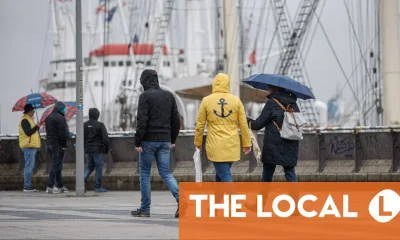What felt personal at first, we came to understand as part of something much deeper.
Despite our earnest efforts to battle through German grammar, to enjoy woody white asparagus and to watchTatort (still hoping and waiting for a good episode), the feeling of belonging here in our adopted homeland remained elusive.
We’ve been here for more than three decades combined, and as journalists our job is to get to know the country – in many cases better than natives.
In some ways, we have been eingedeutscht (Germanised): drinking Radler and sparkling water, and occasionally reporting cars for false parking (this is indeed one of Chris’s pastimes). We have kids here and so have learned about Germany also through the experience of Hebammen, Kitas, and other parents.
READ ALSO: ‘Weeks of wild uncertainty’ – The stress of choosing the right school in Germany
But the feeling of being a guest – or as Germans might say a Fremdkörper (foreign object) – persists, despite the country’s claims of offering a Willkommenskultur.
When we started writing a book about Germany, we realised it’s not just a subjective personal experience. It points to a deeper void at the heart of modern Germany.
The initial goal of writing “Broken Republik” was to cover the cracks in the German economy, but that quickly expanded to political fragmentation and then internal divisions and racism. And we concluded that the red thread that ran through these issues was a national identity still unresolved.
Postwar Germany is supported mainly by two pillars: shared prosperity (Wohlstand für alle) and the self-righteousness of having overcome Nazism.
For decades, the formula held up well enough. Germany became a global industrial power on the back of sleek cars, and instead of parades and fireworks, it showcased Holocaust guilt. But the structure is showing foreboding cracks.
Advertisement
The economy has contracted two years in a row, inequality is worse than almost anywhere else in Europe, and the social safety net is fraying.
With living standards at risk, trust in mainstream parties is falling and support for the Alternative für Deutschland (AfD) and its ethno-nationalist vision of Germany is rising (on par with Chancellor Friedrich Merz’s conservative bloc, which has also adopted anti-migrant rhetoric).
READ ALSO: How is Germany’s future government planning to shake up immigration?
That leaves the country vulnerable. Without a robust and inclusive civic identity, “blood and soil” concepts re-emerge and fill the void. That process has started, but it doesn’t have to continue.
Despite all of its issues, Germany still functions and has a strong foundation. It’s still the third-largest economy in the world. Its cities hum with energy, creativity, and layered history. From the North Sea coast to Alpine peaks, its landscapes offer stillness and awe.
Advertisement
Life here can be rich and full: walking home through tree-lined streets, swimming in a lake on a summer evening, sharing food and language in unexpected places. The culture stretches across centuries and continents — from Bach to Berlin club nights, Bauhaus to Turkish-German poetry, Syrian bakeries to Vietnamese corner shops.
READ ALSO: Seven unmissable events happening around Germany in June 2025
This is a place where people can build lives, raise children and grow old. But belonging is still too often conditional.
People walk along the river banks in Frankfurt. Why can’t long-term residents in Germany vote? Photo: picture alliance/dpa | Andreas Arnold
Germany makes it hard for newcomers. And if your skin colour is dark or you struggle with der, die, das, your pathways to belonging are even rockier.
Even then, it’s an either/or process. You are either all German or you’re an Ausländer.
And even then, it can be capricious. Members of the 2014 World Cup-winning squad, like Mesut Özil, have voiced this frustration: German when they win, foreign when they lose.
The migration-background victims of the Hanau far-right shooting in 2020 struggled for official recognition and national mourning. These moments reveal a painful truth — that for millions, full belonging remains elusive, even in life and death.
That has to change — not out of charity, but because the country’s future depends on it. A society where millions feel unseen cannot remain cohesive. A democracy that excludes cannot stay strong. If Germany wants to thrive — economically, culturally, politically — it needs to open up not just its labour market or borders, but its idea of who truly belongs.
Advertisement
We’ve discovered that this is a foreign concept for Germans. They struggle to understand the alienation that the country produces because they don’t know it any other way. But Wahldeutsche do.
We have an important role to play here. We are part of the story but come with a different perspective. We don’t need to just adapt and integrate. We can also form and shape. In a moment when the far right seeks to define who matters, silence is no longer a neutral act — it’s surrender.
Postwar Germany may have been unable to face these issues, but a new era is dawning. And the country’s greatest challenge may also be its greatest chance: a new German nationhood built on inclusion. Because a Germany that sees identity as a layered yet cohesive whole – like a Black Forest cake – might yet become a homeland for all, and more dynamic than ever.
Chris Reiter, originally from the US, is a senior editor at Bloomberg News in Berlin. Will Wilkes, originally from the UK, is automotive and industrial correspondent for Bloomberg News in Frankfurt. Follow these links to get more information about Broken Republik (Bloomsbury) and to purchase a copy. For information in German: Totally Kaputt (Piper Verlag).





































